| Srl | Item |
| 1 |
ID:
098857
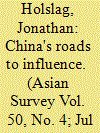

|
|
|
|
|
| Publication |
2010.
|
| Summary/Abstract |
This paper argues that although the People's Republic of China is promoting crossborder networks as a new regional common good, it is driven by both the fear of losing influence to other powers and the desire to create an open economic order in pursuit of Chinese interests. As in most forms of communication, it also appears in this case that the strongest player is best positioned to use these channels to its own advantage.
|
|
|
|
|
|
|
|
|
|
|
|
|
|
|
|
| 2 |
ID:
148646
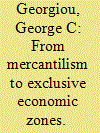

|
|
|
|
|
| Summary/Abstract |
This essay traces the transfer of private ownership of economic resources from sovereign rulers to the modern nation-state, starting with mercantilism and ending with exclusive economic zones. Nation-states were initially envisaged as bodies that acted on behalf of their citizens, but over time they have become distant from democratic processes as they have sought to claim property rights over more and more of the planet, and now of outer space. Consequently, what remains of the global commons is on the verge of extinction. This essay examines whose interests such activities serve and the resulting implications.
|
|
|
|
|
|
|
|
|
|
|
|
|
|
|
|
| 3 |
ID:
084612
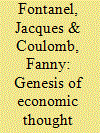

|
|
|
|
|
| Publication |
2008.
|
| Summary/Abstract |
This article links the development of political and philosophical thought with that of economic thought concerning war and peace issues. The economic orthodoxy that emerged during the 17th century presented human relations as peaceful, society being governed by a 'natural order', the Smithian 'invisible hand'. On the other hand, political theory saw emerging a realistic view with human relations characterized by violence, with conflict being society's normal state. This dichotomy explains the relative scarcity of economic studies on war and peace issues and the fact that these have been more often studied by heterodox authors.
|
|
|
|
|
|
|
|
|
|
|
|
|
|
|
|
| 4 |
ID:
084614
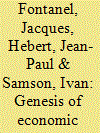

|
|
|
| 5 |
ID:
159019
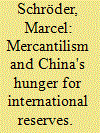

|
|
|
|
|
| Summary/Abstract |
This paper is motivated by the popular view that the surge in China's foreign exchange reserves is due to a distortionary exchange rate policy aimed at keeping the real exchange rate undervalued to support export-led growth. It undertakes an in-depth empirical investigation to quantify how much “mercantilist” and “precautionary” motives have contributed to the reserve build-up in China during 1998Q4-2011Q4. A substantial problem is that theory is consistent with employing two vastly differing approaches to defining and estimating the role of mercantilist reserve accumulation. A priori, either method could generate misleading results. The study shows, however, that the distinction between the two approaches is immaterial in China's case. The results suggest that mercantilism accounts for less than 10% of reserve accumulation. Precautionary motives and other factors seem to be the dominant determinants of the surge in China's international reserves.
|
|
|
|
|
|
|
|
|
|
|
|
|
|
|
|
| 6 |
ID:
083741
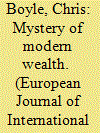

|
|
|
|
|
| Publication |
2008.
|
| Summary/Abstract |
Taking its cue from Jacob Viner's classic essay `Power versus Plenty', this article explores the social foundations of one of International Relations' basic analytic categories: `wealth'. An examination of changing notions of economic value in the early-modern period suggests that Viner's assessment of the unenlightened attitudes of mercantilist statesmen needs revision. The rise of a liberal world order presupposes not just a clearer understanding of the nature of value, and how best to obtain it, but a fundamental transformation in the character of value itself - from an attribute of metallic money alone, to an abstract economic property of all human labour. In accounting for this shift we reveal an underlying structure of social relations whose development lies at the root of both our modern notion of value and of the liberal international economy itself.
|
|
|
|
|
|
|
|
|
|
|
|
|
|
|
|
| 7 |
ID:
101786
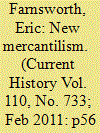

|
|
|
| 8 |
ID:
033309


|
|
|
|
|
| Publication |
New York, Praeger Publishers, 1976.
|
| Description |
xviii, 288p.: table, figures, maps.Hbk
|
| Series |
Praeger Special Studies in International Politics and Government
|
| Standard Number |
0275556107
|
|
|
|
|
|
|
|
|
|
|
|
Copies: C:1/I:0,R:0,Q:0
Circulation
| Accession# | Call# | Current Location | Status | Policy | Location |
| 016127 | 946.9042/FIE 016127 | Main | On Shelf | General | |
|
|
|
|
| 9 |
ID:
103716
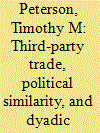

|
|
|
|
|
| Publication |
2011.
|
| Summary/Abstract |
A growing literature maintains that trade is pacifying to interstate relations, and recent work on trade networks suggests that this pacifying effect extends to indirect trade ties. In this article, it is argued that third-party trade can also have an aggravating effect within dyads, by threatening to alter the dyadic balance of capabilities. For the state trading outside the dyad, trade gains from third parties provide incentives to demand change in the dyadic status quo and finance violent conflict when dyadic disputes arise. For the state whose dyadic partner trades with third parties, potential for the trading state to grow increasingly more powerful encourages action to prevent erosion of the non-trading state's relative power. These aggravating effects are conditional, however, on dyadic political similarity, as concerns for relative capability shifts decrease when states do not view their dyadic partners as threats. Hypotheses derived from this argument are tested on data spanning 1885 to 2000. Results support these hypotheses, suggesting important implications for the literature on trade and conflict. When extending the relative gains arguments associated with realism beyond the dyad, a clear, yet conditional, aggravating effect of third-party trade emerges.
|
|
|
|
|
|
|
|
|
|
|
|
|
|
|
|